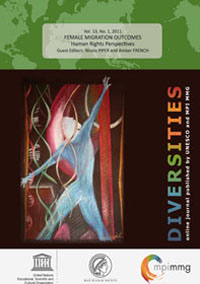Transnational Migration and Changing Gender Relations in Peruvian and Bolivian Cities
by Tanja Bastia (University of Manchester) and Erika Busse (University of Minnesota)
To cite this article: Bastia, T., & Busse, E. (2011). Transnational Migration and Changing Gender Relations in Peruvian and Bolivian Cities. Diversities, 13(1), 19–33. https://doi.org/10.58002/c0mt-xg26
Labour migration has profound implications for the reconfiguration of gender relations. Most of the literature has focused on the changing status of women in so-called ‘host’ countries. However, it is well recognised that migration creates ripples of change throughout the migration process, not just at destinations. In this paper we draw the readers’ attention to the changes that take place as a result of cross-border labour migration in places of origin. We focus on gender as an analytical concept, rather than just women as subjects. Through a comparative analysis of male-led and women-led migration, we analyse the changes that migration brings about for women in places of origin, particularly Bolivian and Peruvian cities. On the basis of in-depth interviews with women in low-income urban and peri-urban neighbourhoods we find that in both women-led and male-led migration patriarchal relations are challenged but then reconstituted.
|
